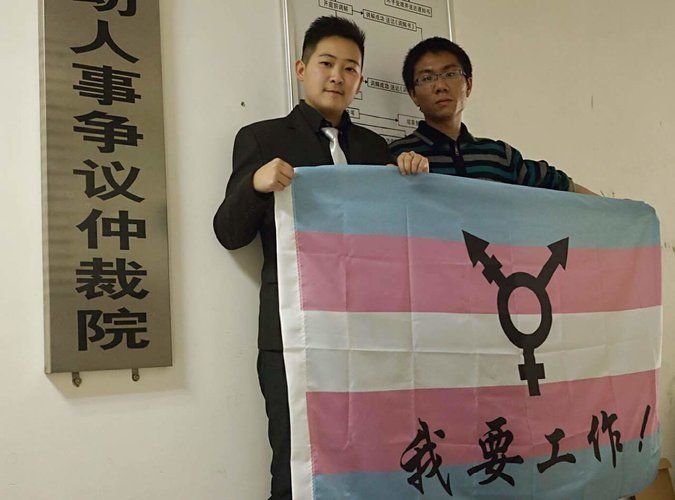Discrimination is international
 Yesterday in southern China a labor arbitration panel held a hearing in China's first legal case claiming employment discrimination on the basis of gender identity.
Yesterday in southern China a labor arbitration panel held a hearing in China's first legal case claiming employment discrimination on the basis of gender identity.
Identified only as Mr. C, the 28-year-old plaintiff says that he has identified as a transgender man since college.
Mr. C applied for a sales job with the Ciming Health Checkup Center in Guiyamg, Guizhou Province, last April.
He said he passed a face-to-face interview in men’s clothes with the company’s human resources manager, Jin Yuping. Mr. C said the manager was aware that his biological sex was female and did not object when he left blank the “gender” box on his application form.Ms. Jin told him he would have to learn the ropes for seven working days before signing an official employment contract, he said. However, when he and his mentor visited Ms. Jin’s office after the probation period, she asked Mr. C to wait outside.
My mentor later told me that she said she felt there was something wrong with me at first glance, and said I must be gay because I dress this way. The mentor also told me she said something like: ‘We’re a health checkup firm. How can we provide services to customers if our employees are unhealthy?’
I was infuriated and surprised. I don’t want to be called gay because in that way I’m admitting that I’m a woman.
And even if I am gay, how can she say I’m unhealthy?” he asked. How can a health checkup firm not know that homosexuality is no longer considered a disease?
--Mr. C
The Chinese Psychiatric Association removed homosexuality and bisexuality from its list of illnesses in 2001.
Mr. C’s lawyer, Huang Sha, said he was able to establish a labor relationship at the hearing on Monday even though no contract had been signed, because Mr. C had kept a recording of his conversation with Ms. Jin from when he was fired and because the company had admitted to the hiring at a mediation session in late March.
The reason they provided for firing Mr. C, which was his gender expression, is not included in the list of reasons for dismissal in China’s labor law.
--Mr. Huang
Mr. C has asked for a week’s wages and an extra month’s salary, which would total about 2,000 renminbi, or about $300. Mr. C said he was also hoping that the company would offer a written apology, although a labor arbitration panel does not have the power to order that. Mr. C said he planned to bring the case to court if the company refused to apologize.
Mr. Huang said although the company said it had dismissed Mr. C for incompetence, it provided no evidence to support this assertion. He said the company also said Mr. C had failed to wear its uniform, but later said uniforms were provided only to employees who had completed their probation periods.
Mr. C, a journalism graduate who has run a lesbian, gay, bisexual and transgender support group for nine years, said he had heard of job discrimination but had never expected to experience it.
Before the job at Ciming, he said, he had interned at a television station and worked for an insurance company and in direct sales without encountering any prejudice. But his dismissal from Ciming shattered his self-esteem, he said, and he began volunteering information about his transgender identity in job interviews to avoid later misunderstandings.
I would tell them, I work and live as a man, but I am capable. But as long as I said I was transgender, I never hear back from them.
--Mr C
Actually, we are suing in the hope that the case could help push for an anti-job discrimination law. The compensation means nothing to me.
--Mr. C
My view is that transgender people’s rights to employment, their basic right to make a living, must be guaranteed.
--Sun Xiaomei, women’s studies professor at China Women’s University in Beijing and a delegate in the National People’s Congress
In recent years, gay and lesbian rights movements have received greater attention, but the transgender voice is absent. This case breaks the silence of transgender people.
--Tingting Shen, Asia Catalyst
Ms. Tingting said job discrimination against transgender people was “pervasive” in China, and that many were forced into commercial sex because they were unable to find other work.

